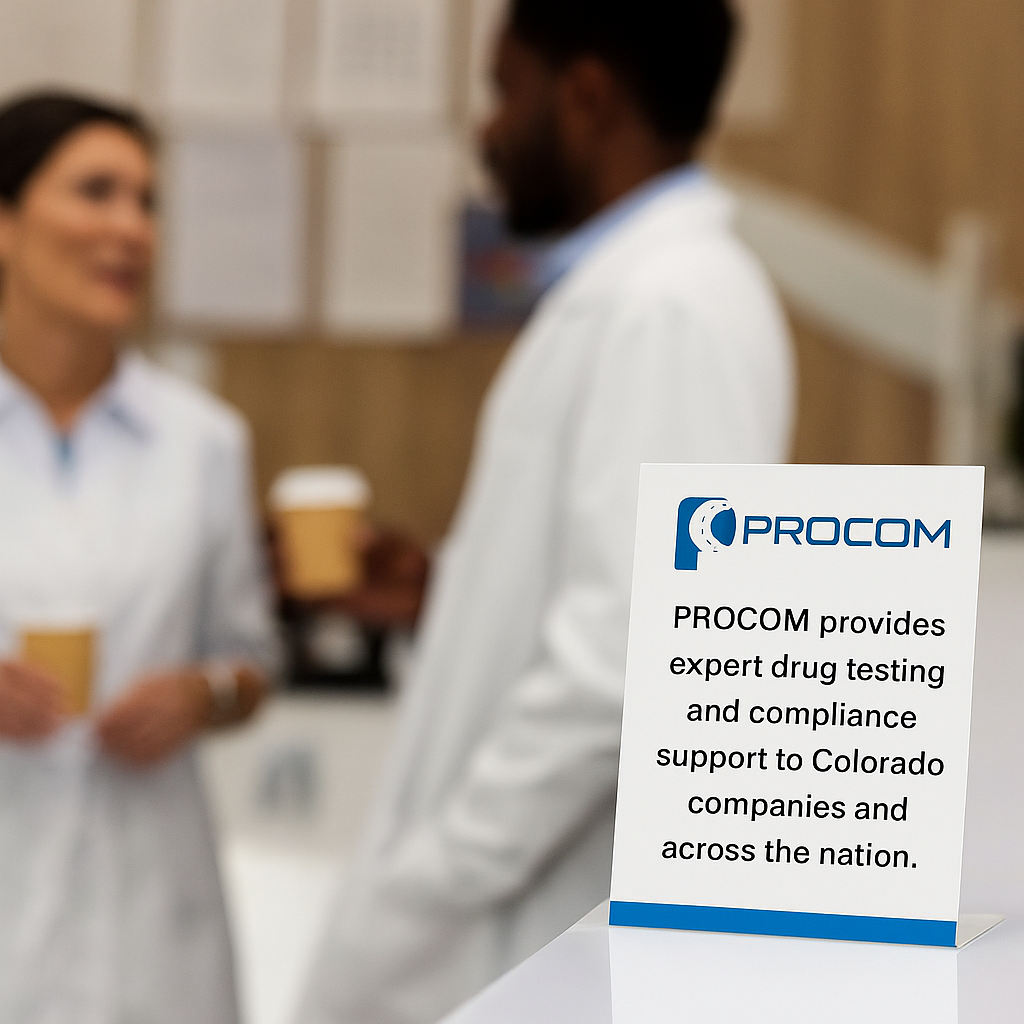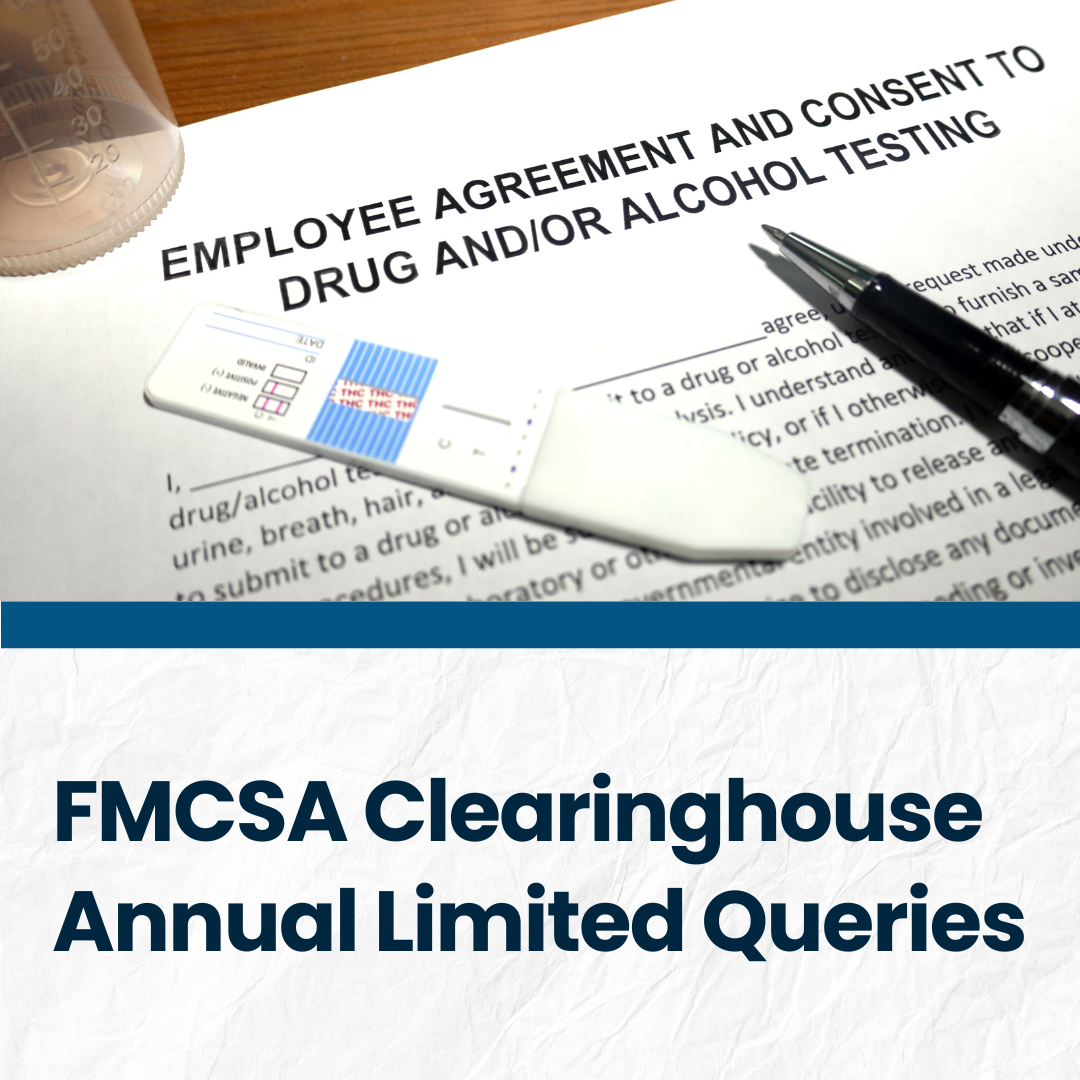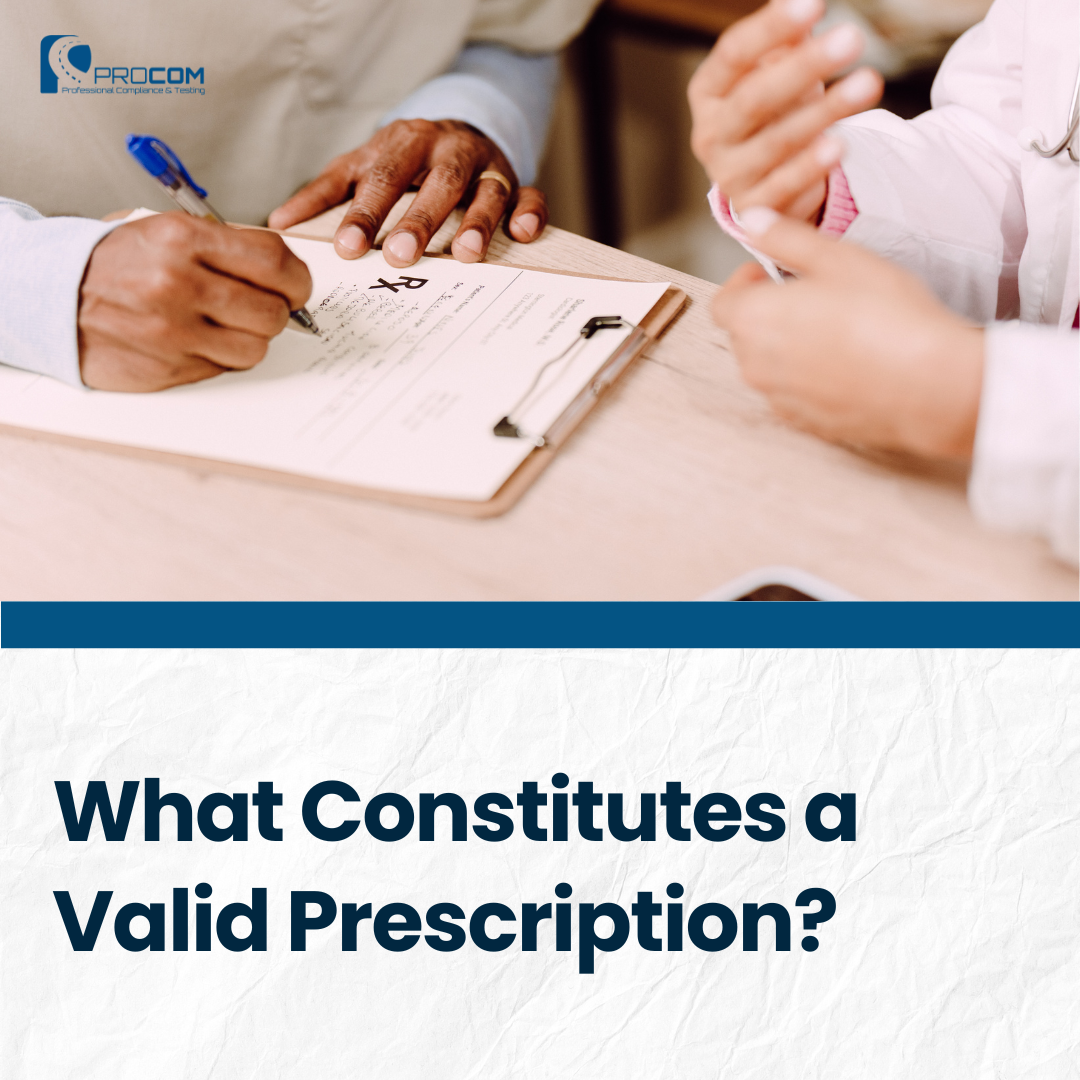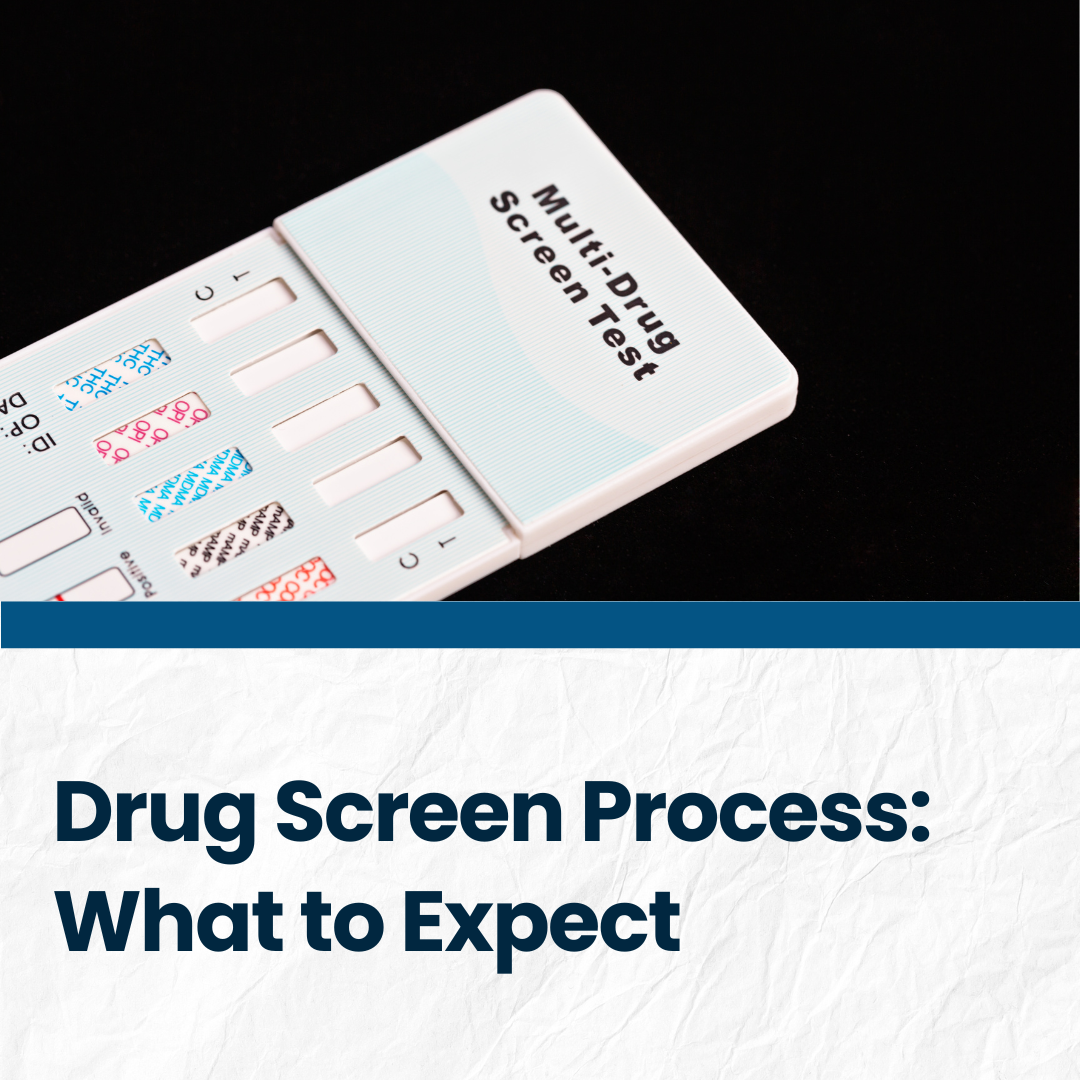If you’re managing a Colorado-based workforce, drug testing isn’t just about compliance—it’s about keeping operations efficient and costs down. Whether you’re screening CDL drivers in Denver or onboarding new hires in Glenwood Springs, knowing the difference between onsite drug testing and clinic-based testing can have a direct impact on productivity, scheduling, and your bottom line.
Key Takeaways for Employers
- Onsite drug testing minimizes employee downtime and increases scheduling flexibility.
- Clinic testing may offer consistency for smaller teams or isolated incidents.
- The right choice depends on your location, workforce size, and testing frequency.
- Procom provides both onsite and clinic testing across Colorado—including Denver, Glenwood Springs, Pueblo, and Grand Junction.
What Is Onsite Drug Testing?
Onsite drug testing means the testing team comes to you. Whether it’s a warehouse, construction site, or transit depot, trained collectors arrive on-site and conduct screenings without your employees needing to leave work.
Benefits of Onsite Testing:
- Reduced downtime – No more hours lost driving to a clinic.
- Greater control – Testing happens on your schedule.
- Scalability – Ideal for random testing or onboarding multiple employees at once.
- Better compliance – Fewer missed appointments or policy deviations.
Learn more about how onsite testing works in our on-site testing overview.
What Is Clinic-Based Testing?
With clinic testing, employees travel to a certified facility to complete their drug or alcohol screening. This option may be better for small businesses, rural offices, or occasional testing needs.
Advantages of Clinic Testing:
- Structured process – Clinic workflows are consistent and standardized.
- Geographic convenience – Useful if your workforce is spread out across smaller towns.
- No setup required – No need to coordinate logistics or workspace setup.
Procom offers multiple clinic locations in Colorado, including Denver, Glenwood Springs, Pueblo, and Grand Junction.
Onsite vs. Clinic Testing: Which Saves More?
Let’s break it down:
| Factor | Onsite Testing | Clinic Testing |
| Time Efficiency | High – reduces travel and wait times | Lower – employees leave work to test |
| Cost for Large Teams | More cost-effective per test | Can become expensive at scale |
| Customization | Flexible scheduling and batch testing | Standardized appointment times |
| Logistical Complexity | Requires setup and coordination | Minimal—handled by clinic |
| Best For | Larger employers, frequent/random testing | Small teams or one-off tests |
In high-density areas like Denver, where traffic and employee downtime can cost you, onsite testing offers real savings. In smaller communities like Glenwood Springs or Pueblo, a clinic visit may be the simpler option.
Colorado-Specific Considerations
Drug testing in Colorado requires a clear understanding of how state laws interact with federal requirements—especially when your business involves DOT-regulated employees, federal contracts, or safety-sensitive roles.
Marijuana Use Is Legal—But Not Protected
Colorado has legalized both recreational and medical marijuana. However, that does not mean employees are protected if they test positive at work.
- Marijuana remains a Schedule I drug under federal law, which overrides state protections in many workplace scenarios.
- Colorado courts (e.g., Coats v. Dish Network) have ruled that employers can terminate employees for marijuana use—even off duty—if it violates company policy.
- For DOT-regulated roles, marijuana use is strictly prohibited, regardless of state law.
Written Drug Testing Policies Are a Must
Colorado does not have a state law that mandates drug testing. However, to enforce testing and protect your business, you must:
- Create a clear, written policy that explains your testing procedures.
- Apply that policy consistently and fairly across your workforce.
- Define when and how testing will occur—pre-employment, post-accident, random, return-to-duty, or reasonable suspicion.
Failing to follow a documented policy can impact your ability to deny unemployment claims or enforce discipline.
Understand DOT vs. Non-DOT Testing Obligations
For DOT-covered employees:
- You must follow 49 CFR Part 40 guidelines, which include strict chain-of-custody, observed testing requirements, and federal reporting.
For non-DOT roles (including probation-based or general workplace testing):
- You have more flexibility in test type—urine, saliva, or hair.
- You are still responsible for ensuring fairness, documentation, and procedural compliance.
Procom supports both types of programs and can help you distinguish between federal mandates and discretionary policies.
Post-Accident Testing & Workers’ Compensation
Colorado law allows employers to reduce an injured worker’s wage replacement benefits by up to 50% if:
- The employee fails or refuses a post-accident drug test.
- The test shows use of a controlled substance (including marijuana).
- There is no “clear and convincing evidence” that the substance didn’t contribute to the injury.
This reduction does not apply to medical benefits but can significantly impact your claims exposure.
Federal Contracts and the Drug-Free Workplace Act
If your company receives federal grants or holds federal contracts, you must comply with the Drug-Free Workplace Act of 1988. This includes:
- Maintaining a drug-free workplace policy.
Providing employee education on substance use. - Reporting criminal drug convictions in the workplace within five days.
- Conducting testing through certified laboratories when required.
Procom aligns with federal expectations and helps ensure your program meets both contract obligations and public safety standards.
For deeper guidance on compliant workplace policies, refer to:
These resources outline key practices for employers managing drug-free programs under both federal and state frameworks.
Procom’s Local Advantage
We offer Colorado employers direct, reliable access to comprehensive drug and alcohol testing services—whether onsite or at one of our certified clinics.
- Clinic testing across Colorado – Denver, Glenwood Springs, Pueblo, and Grand Junction
- Fully mobile onsite testing teams – Trained professionals dispatched directly to your location
- Flexible scheduling – Designed around your shift changes, onboarding waves, or DOT requirements
Full compliance support – Including policy documentation, training, and supervisor tools (Procom Services)
FAQs: Colorado Drug Testing Options
Is onsite drug testing allowed in Colorado?
Yes. Onsite testing is fully compliant when performed by certified professionals. Procom’s collectors follow strict chain-of-custody and DOT-compliant procedures.
How do I decide between onsite and clinic testing?
If your workforce is large, fast-paced, or spread across multiple shifts, onsite testing typically saves more time and money. For smaller teams or infrequent testing, clinics may be more convenient.
What types of tests can be done onsite?
Urine, saliva, breath alcohol, and even some rapid drug panels can be done onsite depending on your needs and compliance requirements.
Do I need to provide space for onsite testing?
Yes, but only a minimal setup is needed. Procom will walk you through what’s required—a private restroom and a secure area are usually sufficient.
Does Procom offer after-hours testing?
We do. Our mobile teams support after-hours, weekends, and emergency post-accident testing across much of Colorado.
Is return-to-duty testing observed?
Yes. All return-to-duty and follow-up drug tests must be observed as per DOT rules.
Can I get a court-ordered drug test here?
Yes. We work directly with courts and probation offices to provide certified, chain-of-custody testing.
Can I get a court-ordered drug test here?
Yes. We work directly with courts and probation offices to provide certified, chain-of-custody testing.
Compliance is non-negotiable—but flexibility is essential.
Procom gives you both. Whether you’re running a logistics operation in Denver or onboarding in Glenwood Springs, we’ll help you find the testing solution that works best for your team and your bottom line.




